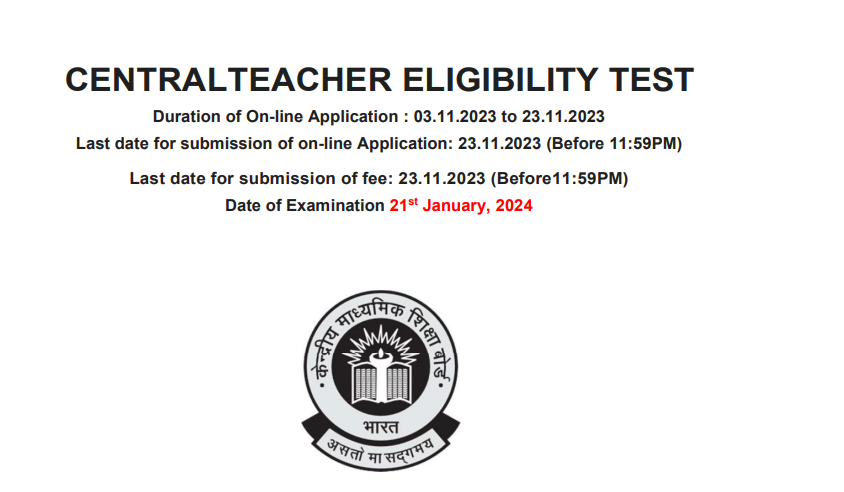| Exam |
CTET 2025 |
| Authority |
Central Board of Secondary Education |
| Type of Exam |
Paper 1 and Paper 2 |
| Eligibility |
D.El.Ed or B.Ed Pass with Graduation |
| Age Limit |
Minimum 18 Year |
| CTET December 2025 Notification |
Soon |
| CTET Dec. Exam Date |
Soon |
| |
|
| CTET Registration 2025 Date |
Soon |
| Official Website |
https://ctet.nic.in/ |
CTET 2025 : Eligibility
Nationality - CTET Exam में शामिल होने के लिए उम्मीदवार का भारत का नागरिक होना आवश्यक है या नीचे बताई गई किसी एक Conditions को fulfill करना चाहिए -
- A Nepali Subject
- A Bhutani Subject
- वैसे उम्मीदवार जो की 1 जनवरी 1962 से पहले तिब्बत से भारत का स्थाई नागरिक बनने की इरादे से आए हो।
- वैसे उम्मीदवार जो कि पाकिस्तान , श्रीलंका, केन्या, युगांडा, तंजानिया ,वर्मा ,वियतनाम, जांबिया , इथोपिया से भारत के स्थाई नागरिक बनने की इरादे से आए हो।
Educational Qualification - CTET Exam CBSE के द्वारा साल में दो बार करवाई जाती है। इस परीक्षा में दो Paper होते हैं , Paper 1 और Paper 2 . Paper 1 वैसे उम्मीदवार के लिए है जो Primary Teacher बनना चाहते हैं Paper 2 वैसे उम्मीदवार के लिए है जो Upper Primary Teacher बनना चाहते हैं। इन दोनों ही पेपर के लिए CBSE द्वारा अलग-अलग minimum Educational Qualification बताई गई है जो कि इस प्रकार से हैं -
Educational Qualification for Paper l
- उम्मीदवार भारत के किसी भी मान्यता प्राप्त विद्यालय से कक्षा 12वीं कम से कम 55% अंकों के साथ पास होना चाहिए।
- साथ ही 2 Years Diploma in Elementary Education (D.El.Ed) होना चाहिए।
Educational Qualification for Paper ll
- उम्मीदवार भारत के किसी भी मान्यता प्राप्त विश्वविद्यालय से किसी भी विषय में ग्रेजुएट होना चाहिए।
- साथ ही B.Ed होना चाहिए।
इसके अलावा NCTE (National Council for Teacher Education) के अनुसार -
(i) अगर उम्मीदवार किसी भी तरह के TTC (Teacher Training Course) को कर रहे हैं तो वह भी CTET Exam के लिए eligible है।
(ii) अगर उम्मीदवार Post Graduation के साथ B.ed या M.ed की डिग्री कर रहे हैं तो वह भी CTET Exam के लिए eligible है।
Age Limit - जो भी उम्मीदवार CTET Exam 2025 के लिए आवेदन करना चाहते हैं उन्हें बोर्ड के द्वारा निर्धारित की गई आयु सीमा की मापदंडों को पूरा करना जरूरी है तभी वह इस परीक्षा के लिए आवेदन कर पाएंगे। बोर्ड के द्वारा Minimum and Maximum Age Limit निम्नलिखित प्रकार से बताई गई हैं-
- Minimum Age - 18 Years
- Maximum Age - NA
CTET December 2025 Application Fee
जो भी उम्मीदवार CTET 2025 के लिए आवेदन करना चाहते हैं उन्हें ऑनलाइन माध्यम से आवेदन शुल्क का भी भुगतान करना होगा। आवेदन शुल्क का भुगतान करना अत्यंत ही जरूरी है क्योंकि इसके बिना आवेदन की प्रक्रिया पूर्ण नहीं मानी जाएगी। आवेदन शुल्क का भुगतान ऑनलाइन माध्यम जैसे की क्रेडिट कार्ड , डेबिट कार्ड , नेट बैंकिंग के द्वारा किया जाएगा। विभिन्न श्रेणियां के लिए अलग-अलग आवेदन शुल्क निर्धारित किए गए हैं जिसके बारे में निचे बताया गया है -
| CATEGORY |
Only Paper- I or II |
Both Paper-I & II |
| General/OBC(NCL) |
Rs.1000/- |
Rs.1200/- |
| SC/ST/Diff. Abled Person |
Rs.500/- |
Rs.600/- |
EXAM PATTERN
CTET Exam में MCQ Based प्रश्न पूछे जाएंगे. हर सही उत्तर के लिए उम्मीदवार को एक अंक दिए जाएंगे इसमें गलत उत्तर दिए जाने पर किसी प्रकार की negative marking नहीं की जाएगी।
परीक्षा में दो पेपर पूछे जाएंगे -
Paper l - Paper 1 उन उम्मीदवारों के लिए होंगे जो की कक्षा 1 से लेकर 5 तक के शिक्षक बनना चाहते हो।
Paper ll - Paper 2 उन उम्मीदवारों के लिए होंगे जो कक्षा 6 से लेकर 8 तक के शिक्षक बनना चाहते हो
हालांकि जो उम्मीदवार इन दोनों ही लेवल के शिक्षक बनना चाहते हो उन्हें Paper l and Paper 2 दोनों ही परीक्षा में शामिल होना होगा।
Paper l - Exam Pattern (for Primary Teacher Class l to V)
Paper l में निम्नलिखित विषयों से प्रश्न पूछे जाएंगे
| (i) |
Child Development and Pedagogy(compulsory) |
30MCQs |
30Marks |
| (ii) |
Language I(compulsory) |
30MCQs |
30Marks |
| (iii) |
Language II(compulsory) |
30MCQs |
30Marks |
| (iv) |
Mathematics |
30MCQs |
30Marks |
| (v) |
Environmental Studies |
30MCQs |
30Marks |
| |
Total |
150MCQs |
150Marks |
Paper ll - Exam Pattern ( For Upper Primary Teacher Class Vl to Vlll)
Paper 2 में निम्नलिखित विषयों से प्रश्न पूछे जाएंगे
| (i) |
Child Development & Pedagogy (compulsory) |
30MCQs |
30Marks |
| (ii) |
Language I (compulsory) |
30MCQs |
30Marks |
| (iii) |
Language II (compulsory) |
30MCQs |
30Marks |
| (iv) |
Mathematics and Science |
60MCQs |
60Marks |
| (for Mathematics and Science teacher) |
|
|
| |
| OR |
| Social Studies/Social Science |
|
60MCQs |
60Marks |
| |
(for Social Studies/Social Science teacher)
TOTAL
|
150MCQ |
150MARKS |
उम्मीदवार अपने Language Paper One and Language Paper Two में निम्नलिखित विषयों को choose कर सकते हैं . पर यहां एक बात ध्यान देने योग्य है कि उन्हें Language Paper One and Two में अलग-अलग विषय का चुनाव करना है।
List of Language Paper
- English
- Hindi
- Assamese
- Bengali
- Garo
- Gujarati
- Kannada
- Khasi
- Malyalam
- Manipuri
- Marathi
- Mizo
- Nepali
- Odia
- Punjabi
- Sanskrit
- Tamil
- Telugu
- Tibetan
- Urdu

